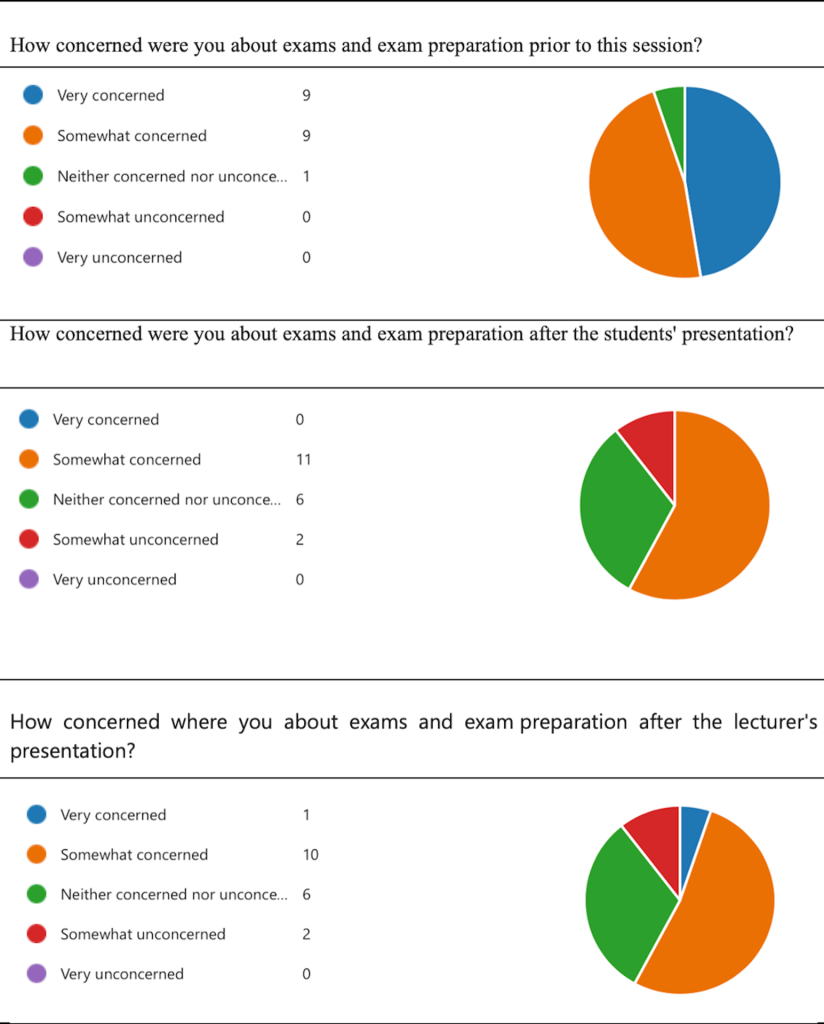Exams play a key role in students’ professional and academic development. Such assessment methods have multiple benefits, which might extend to:
- Knowledge absorption techniques
- Time management skills
- Improved knowledge retention and retrieval
Despite such benefits, the preparation phase leading to exams and the exams themselves can cause of stress and anxiety, which both increase the likelihood of underperformance. We examined the benefits of student-led presentation and lecturer’s guidance as methods to minimise worry.
Knowledge absorption pertains to the practises of acquiring knowledge. In the preparation phase, students develop strategies to better approach the material and recall key information. Such an approach requires a systematic evaluation of information to discern the key elements underpinning the subject. The preparation phase also requires the reconstruction of information and its synthesis from different sources: lectures, seminars and articles. The process preceding the exam and the testing itself might improve organisational and metacognitive monitoring skills. While the former refers to the ability to organise information from multiple sources and formats (i.e. in person discussion, notes, articles, exercises, etc.) in a coherent and logical manner, the latter pertains to students’ ability to self-assess their own comprehension.
The testing itself requires students to operate under time constraints. Students might then be inclined to work on developing time management techniques. In other words, exam performance is dependent on preparedness in addition to preparation. More specifically, according to Osgood, McNally and Talerico, this refers to “regulating attention to the test while ignoring distractions, pacing oneself on questions, being self-aware of one’s own knowledge, and monitoring one’s progress on individual problems against the time”. Therefore, it is such preparedness that positively contributes to performance.
Studies have also confirmed tests’ propensity to enhance knowledge retention even after the test and knowledge retrieval. Both outcomes remain relevant not only to personal development, but also to students’ competitiveness in the job market and job performance. Knowledge retrieval might be useful during job interviews and particularly relevant in the workplace. As exams test broader understanding of the subject, they also allow students to map a given discipline and therefore more easily revise, research and recollect information when needed.
On the other hand, scholarship has also highlighted how exams might be more conducive to stress and anxiety, generally signalling an unpleasant experience for students, as well as a higher likelihood to underperform. There are two main types of anxiety. Anxiety might derive from the inability to sufficiently prepare for the exams, which then triggers further distress, dependent on the process of undergoing the examination itself. We focused on addressing the first type of anxiety concerning the preparation stage. In order to address these considerations, the project developed in three stages: focus groups, surveys and a town hall meeting.
Focus groups were held with students who had already undergone exams (group A) and those who were preparing to take the test (group B). They had the function of assessing concerns expressed by group A, comparing those to group B and providing a more comprehensive understanding of broader concerns around exam preparation. Focus groups showed some differences between students, with some expressing concerns over the exams and others being more confident in undertaking them. Furthermore, another avenue of concerns stemmed more from uncertainty on how to best prepare for exams and what to expect from them. Surveys were then further used to explore overarching concerns in more detail and extended them to the entire cohorts. Concerns structured around how to prioritise information and combine seminars, lectures, and notes (knowledge absorption) as well as time management.
On the basis of the information gathered via focus groups and surveys, we structured the town hall meeting as follows: three students that had already taken exams shared their revision tips and how they approached the exams on the day of testing. The presentations addressed problems related to knowledge absorption (how to prepare and how to prioritise information) and how to better manage time constraints (e.g. keep the introduction simple, spend some time on the outline before writing, etc). Their presentation was followed by the module convenor’s presentation of formative feedback, examples, and advice on how to structure responses to exams using practical examples.
We then administered a further survey to monitor how concerns over exams changed given each treatment (students’ presentation and lecturer’s presentation). 19 students filled out the survey (the cohort is of 80 students).
The exam has an economic component, which created a further challenge. The focus groups and surveys indicate that students with little or no background in economics manifested more concerns. Out of 13 cases, the level of concerns was either very high (7 cases) or somewhat high (6 cases). After the students’ presentation, 7 were somewhat concerned, 4 neither concerned nor unconcerned, and 2 unconcerned. After the lecturer’s presentation, 1 was highly concerned, 6 somewhat concerned, 4 neither concerned nor unconcerned, and the rest unconcerned.
Variety in assessment practises remains a cardinal and highly valued element in education and the acquisition of multiple skills. Exams fulfil some key desirable outcomes in higher education. The analysis might suggest that students’ presentations in addition to more widely diffused lecture discussions and presentations of guidelines might be valuable in reducing concerns, which could be tested in future research and projects. Hearing from peers’ experience might, in fact, prove particularly encouraging when approaching exams.
